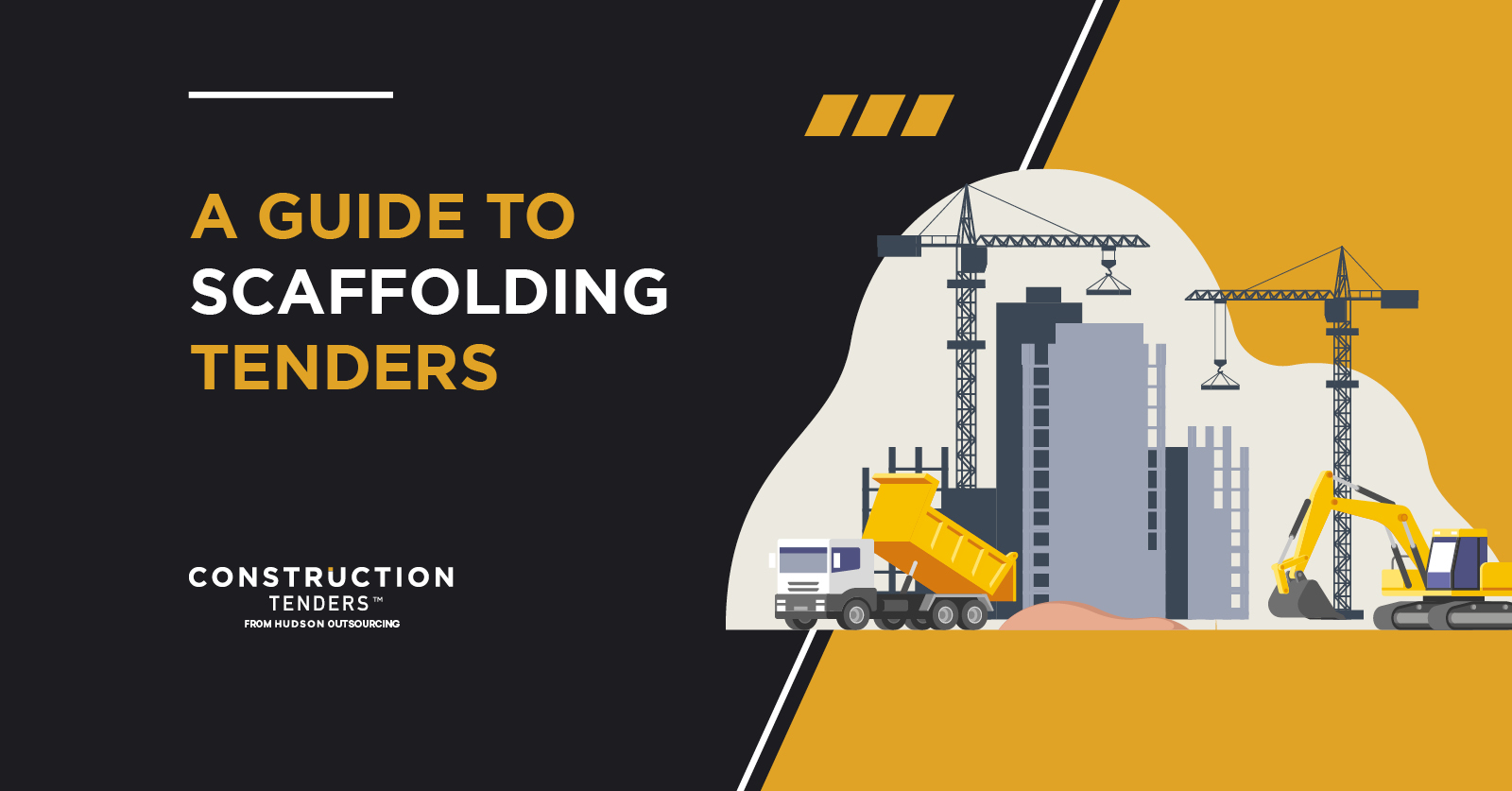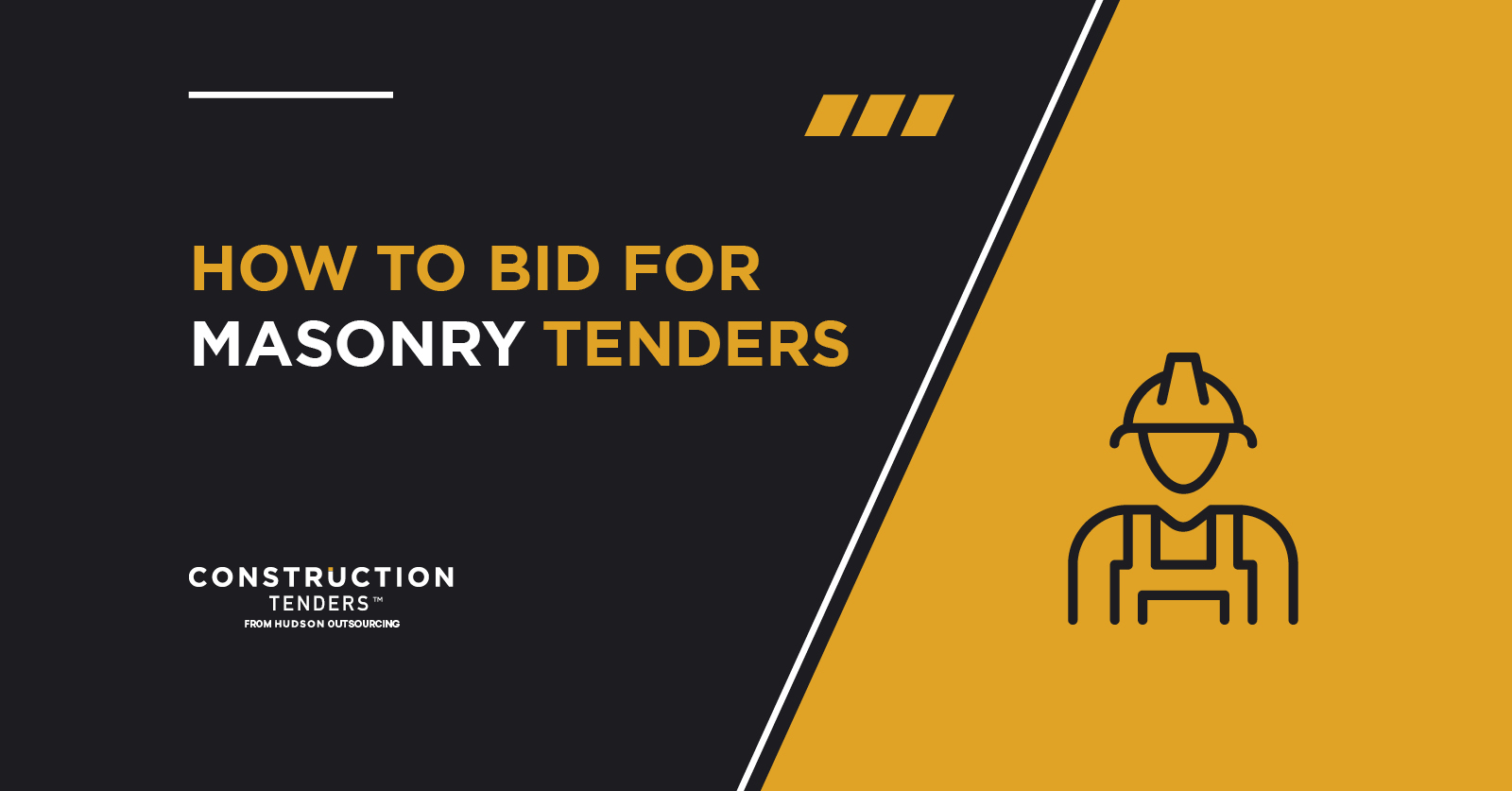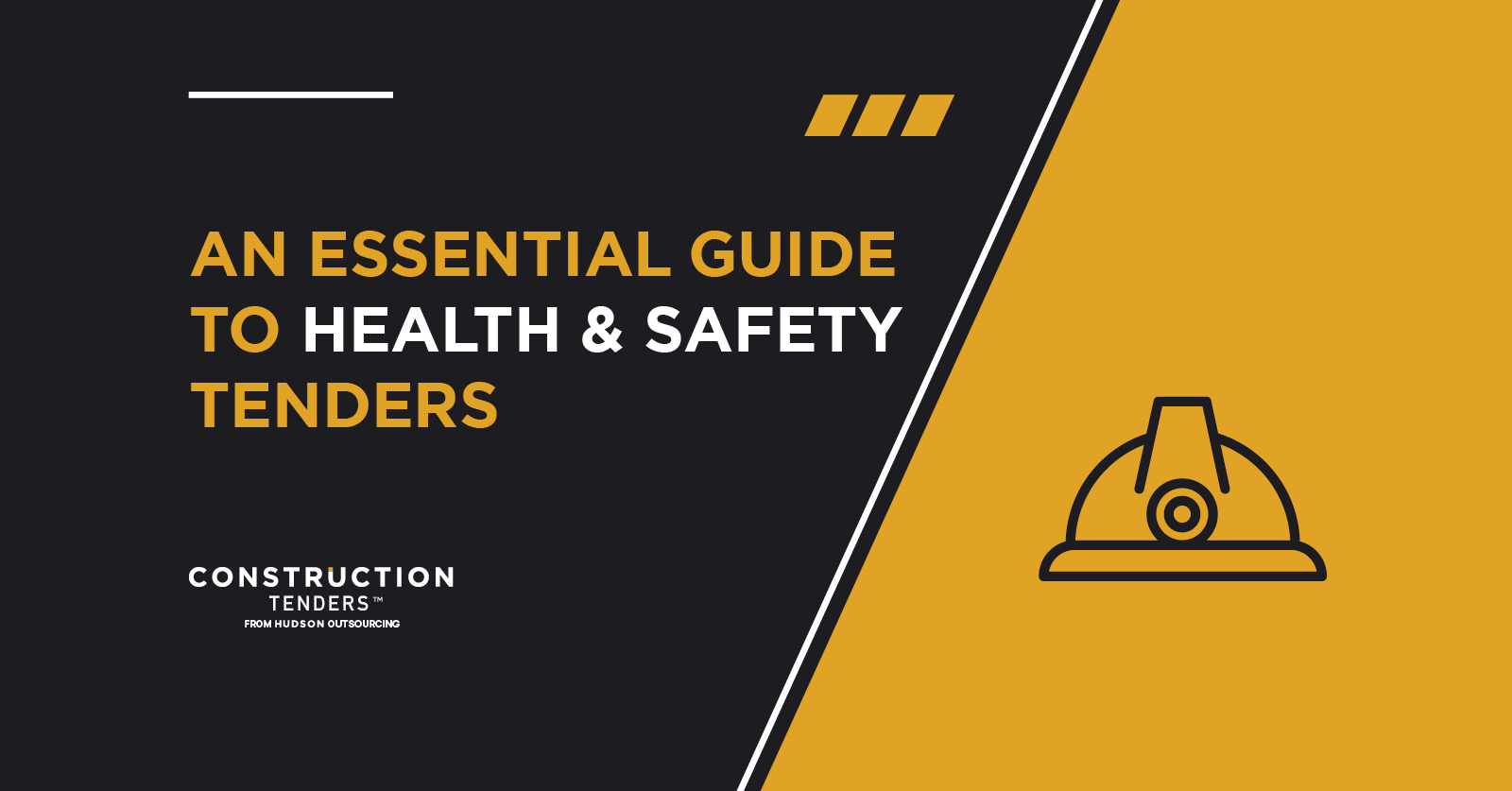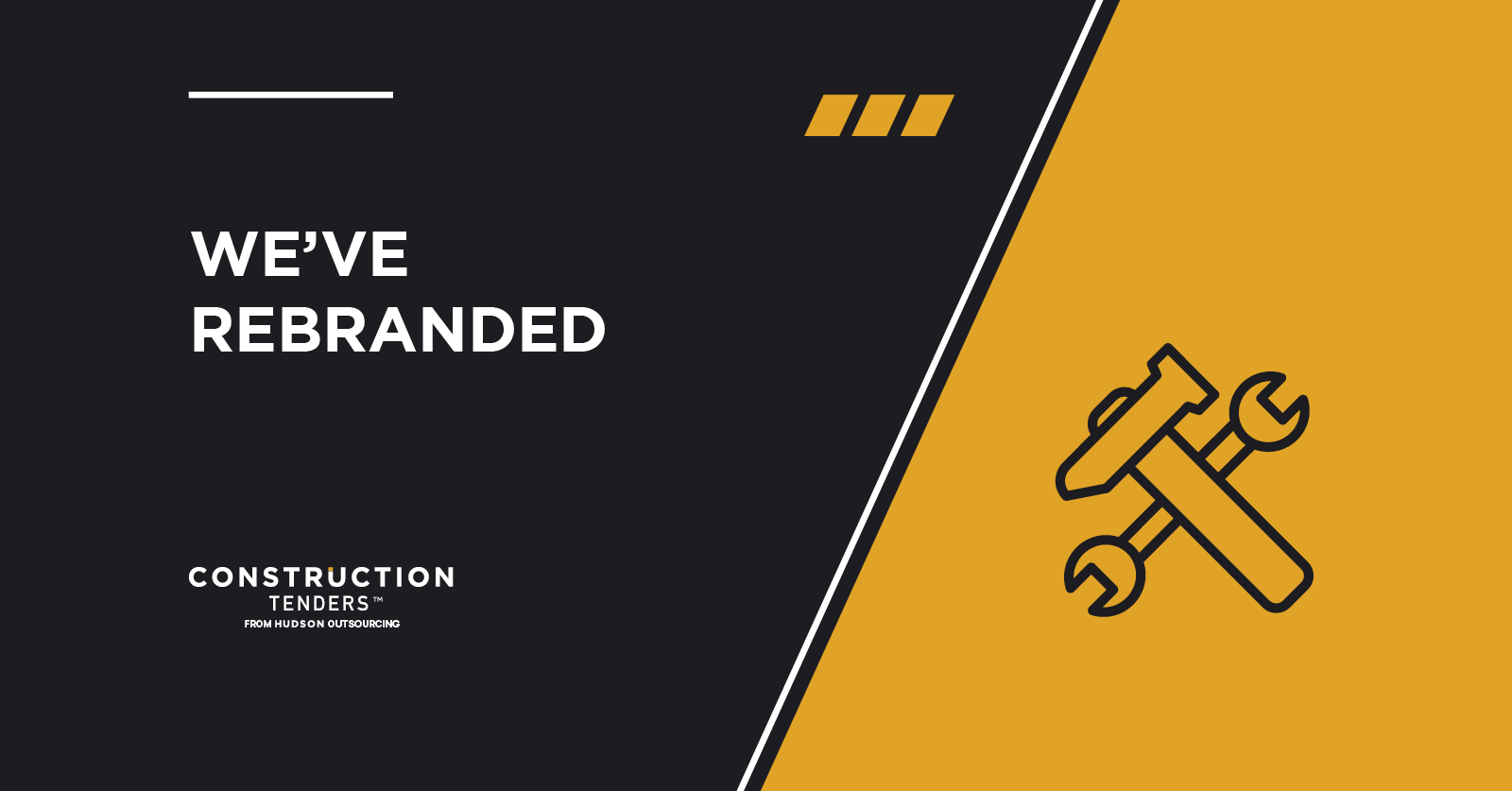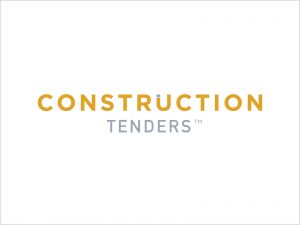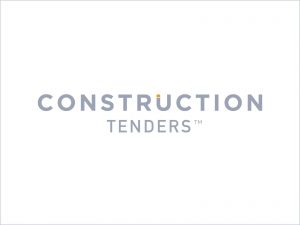Scaffolding Tenders
The construction sector is reliant on high-quality scaffolding service provision. In March 2020 alone, the UK spent £12,720 million in construction work according to the Office for National Statistics.
Opportunities for scaffold tenders may include:
- Assembly and deconstruction
- Scaffold design
- Training
- Scaffolding health and safety consultancy
- Scaffolding security
Scaffolding opportunities are available throughout the UK through:
- Single contract opportunities, awarded to a single supplier;
- Frameworks, frequently divided into Lots and awarded to multiple suppliers;
- Dynamic Purchasing Systems (DPS). Suppliers can join throughout the life of a DPS – these can run for years at a time.
Professional body accreditation
Health and Safety is absolutely paramount to working at height, with any scaffolding tender. Potential suppliers seeking to provide training in scaffolding must be registered with professional bodies. One such professional body is the Construction Industry Scaffolders Record Scheme.
Relevant confederations, memberships and institutes which may be relevant when applying for scaffolding tenders include:
- The National Access & Scaffolding Confederation (NASC). Some buyers may require NASC membership as a specification requirement.
- Industrial Rope Access Trade Association (IRATA). This association aims to provide safer working at height using rope access.
- Work at Height Safety Association (WAHSA). This body is relevant to businesses which manufacture equipment for working at height specifically.
- The Ladder Association. This association is relevant for all organisations whose operations involve working at height.
- The Advisory Committee for Roof Safety (ACR). The ACR provides safety advice for working on roofs.
- Fall Arrest Safety Equipment Training (FASET). This association is dedicated to at-height safety system training, including net riggings.
The Health and Safety Executive (HSE) provides a wealth of information which can support your scaffolding tenders.
The Work at Height Regulations 2005
Any supplier looking to deliver scaffolding works must demonstrate that they comply with The Work at Height Regulations 2005. This is essential for both private and public sector tenders. There are several reasons why compliance is so important:
- Demonstrating compliance evidences that your organisation ensures working conditions are safe for everyone on site.
- The individuals carrying out the work understand how to do it safely and effectively.
- Qualified individuals assess risks and plan mitigations.
- Appropriate equipment is used, maintained and inspected to ensure it is safe.
- Your organisation demonstrated commitment to industry best practice.
So how can you demonstrate compliance when developing your scaffolding tenders?
Evidence is key here. So is demonstrating how you have evidenced compliance in context. Let’s explore this below.
Develop high-quality, relevant case studies
Consider the specification of your next bid in context. Reflect on your experience, and how it can demonstrate current specification requirements.
An excellent method to develop your case studies is using the STAR method. This stands for Situation, Task, Action and Result.
Let’s look at this in more detail.
Situation: who was the client? What were their scaffolding requirements? What was the working environment like? Was it a 10-storey building, or a department store? This opening paragraph should succinctly tell the buyer that you have delivered work close to their specification before.
Task: What works did you need to deliver? This is where you can list specifics which were similar to the specification you are tendering for. For example, did you require certain accreditations or equipment? A good approach here is to talk about particular challenges faced during a contract. Were there very strict timescales? Did you have to work around members of the public to deliver works?
Action: This section should be the largest in your case study. It is the area where you can really shine. For example, if you worked around fragile roof surfaces, how did you assess and control risk? What steps did you take to communicate these risks with your co-workers? How did you plan safe access to any roof surfaces? What strategies did you create to prevent falls, slips and trips whilst working at height? Explain how you met the challenges faced, to deliver excellent service standards.
Results: this section doesn’t need to be extensive. It should summarise any positive outcomes of your service delivery. Here is where you can reinforce deliverables. For example:
“We successfully delivered 95% of KPIs on time. We also improved workplace safety through additional site training. This meant a 0% accident rate throughout the contract.”
Adding a client testimonial here will reinforce your case study and impress the buyer. Creating case studies this way is an excellent method of demonstrating compliance with health and safety regulations. Scaffolding must be assembled to very precise configurations. They must also be designed using specific calculations for various scaffolding types. For example:
- Chimney stacks;
- Loading bays;
- Support scaffolds;
- Bridge scaffolds;
- Temporary ramps;
- Mobile towers;
- Sign board supports;
- and many more.
Scaffolding industry standards include TG20 guidance, by The National Access & Scaffolding Confederation (NASC). TG20:2013 resources provides industry best-practice and European standards for operatives, designers and contractors to safely deliver scaffolding works.
Have a current Health & Safety manual in place
This is essential. Most construction-related tenders will require a copy of your Health & Safety manual during the tendering process. This may be during the Selection Questionnaire Stage (SQ), or as part of your quality response. Having a company-branded manual which is structured clearly and thoroughly proofed will give a good impression to buyers. Our Tender Ready programme can provide support with this.
Ensure that your Health & Safety manual has a named individual responsible for review and monitoring it. This could be a company director or a Health & Safety Officer. It must also be reviewed and dated within the past year. These reviews are important, because they demonstrate the policy is updated as the industry and legislation changes. The manual should address not only construction-general health and safety matters, but also scaffolding-specific matters too.
Examples are invaluable for your bid submission
It is incredibly useful to keep a bank of health and safety evidence on file. Many construction bids will request an example risk assessment, for example. Supplementary supporting evidence can include:
- Risk assessment templates
- Inspection recording form
- Self-audit templates
- A Personal Protective Equipment (PPE) register
- Staff training and induction records
- Equipment inspection templates
- Example method statements
Scaffolding operative competency
Demonstrating your organisation’s training processes will give the buyer confidence in your proposed services. Therefore, a good approach for construction contracts is to ensure your training process is documented. Let’s look at this in more detail.
A training policy will detail your organisation’s objectives, responsibilities and processes. These must align with construction sector legislation, Acts and best practice. Within the training policy, it is helpful to clarify how you record, monitor and evaluate staff learning. This can also detail expected timescales and methods to support staff development. Continuing Professional Development (CPD) should be expected in all industry sectors. Training can involve:
- Enrolment on apprenticeships and formal schemes
- Vocational qualifications
- Completion of NVQ and skills tests
- Completion of supervised scaffolding site experience
The Construction Industry Scaffolders Record Scheme (CISRS) is a popular training option. This is because it embeds best practice and TG20:13 scaffolding standards.
In all cases, training you deliver must also embed broader health and safety construction principles, including:
- First aid protocols
- Slips, trips and falls
- Site access
- Personal Protective Equipment (PPE)
- Inspections and audits
- Waste management procedures
- Emergency procedures
- Rules on site
- Reporting injuries
Evidencing training effectively will demonstrate your organisation continually manages and improves on safety and operations.
Coronavirus and the construction sector
Key to tenders going forward is the effective management of coronavirus. Many buyers will expect this to be considered within tender responses. As locations of scaffolding tenders may change, it is important to carry out site-specific coronavirus risk assessments. You must also plan how you will communicate risk management strategies to your workforce. This can involve surveys, online or socially distanced discussions, for example.
Coronavirus may impact how your site receives scaffolding deliveries. You may need to plan in advance strategies to reduce delivery frequencies and minimise contact between people. Coronavirus may also impact how you manage staff schedules. You may need to assess how many staff can safely be on a scaffolding site at one time. Referring to government guidance will support your tender response planning phase.
Have you found a scaffolding tender perfect for your organisation? We provide writing support and professional consultation, to help you maximise your chances of success. Our dedicated team of bid writers have extensive experience delivering tendering expertise.
Whether you are tendering for the first time or have tendered before, we have a service suitable for you. We tailor each service to your needs, offering the following tender packages:
- Tender Ready
- Tender Writing
- Tender Improvement
- Tender Mentor
And if you haven’t found your perfect scaffolding tender opportunity yet? Our Construction Tenders portal is perfect for you. Our opportunity trackers manually search the latest scaffolding tender opportunities daily. Signing up to the portal, you will receive these opportunities straight to your inbox. What’s easier than that?
Get in touch with Construction Tenders
Sign up to Construction Tenders today and receive a daily construction leads bulletin straight to your inbox. The bulletin contains all the relevant small, and larger, construction tenders that we have uploaded that day.
Below are some scaffolding tenders sourced on our portal:
Provision of Scaffolding – Housing Responsive Repairs
North Tyneside Council- North East- Budget: Undisclosed
Scaffolding All Aspects
North Tyneside Council- North East- Budget: £400,000
Housing Programmed Scaffolding Works
North Tyneside Council- North East- Budget: Undisclosed
Framework Agreement for the Supply & Erection of Scaffolding
Pembrokeshire County Council- Wales- Budget: Undisclosed
Scaffolding Framework
Berneslai Homes- Yorkshire and Humber- Budget: £2,800,000
Our Opportunity Trackers manually scour and upload scaffolding tenders from hundreds of websites across the UK. You are able to filter the results by keyword, budget location and more. This means no more missed opportunities from purely relying on CPV codes which are often mislabeled. Our Construction Tenders portal hosts tendering opportunities from across the construction sector.
This includes the following:
- Scaffolding Tenders
- Architectural Tenders
- Refurbishment Tenders
- Brickwork Tenders
- Building Works
- Health & Safety Tenders
- Small Construction Tenders
- Civil Engineering Tenders
- Electrical Tenders
- Surveying Tenders
- Demolition Tenders
- Flooring Tenders
- Glass Tenders
- M&E
- Cost Consultancy
- Painting Contracts
- Decorating Tenders
- Masonry and many more.
And if you have any questions, your dedicated we will be on hand to help. What opportunities will you find? Contact us today, for a free live demo and find out how our exclusive member’s site can benefit you.
